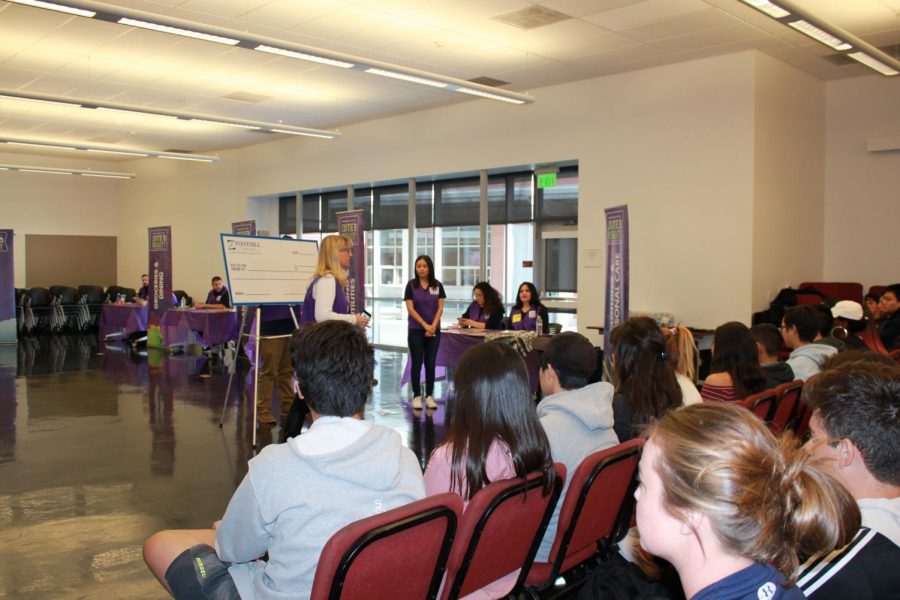A Bite of Reality
March 5, 2018
On Feb. 27, a budget simulation event was held in the Multipurpose Room for Mrs. Ackerman’s Economics classes, in order to better educate them on the preparation and management of personal finances in their day-to-day lives. Called “Bite of Reality”, the event, which was hosted by Foothill Credit Union (FCU) as part of the Richard Myles Johnson Foundation, gave its participants a chance to experience the struggles of living on a limited budget firsthand through a smartphone app of the same name.
The event started off with a thorough demonstration on the do’s and don’ts of writing a check correctly. A volunteer from FCU went through the proper steps to writing out a check, from how to fill out each line, to how to cash it once you’ve received one. The students were allowed to ask questions about the process. One student was chosen to fill out a large cardboard check, and received a gift card for participating.
Afterwards came the spotlight of the event: the budget simulation. Students were given simple instructions on how the app functions— they were assigned a “persona” to live as, complete with an occupation, monthly salary, as well as their character’s family situation. Based off of those details, the students walked around the room to visit the nine stations that were set up. These stations each had two volunteers, who provided students the different expenditures they were expected to make on an everyday basis as an adult. From child care to transportation, food to household items, all of these were to be accounted for.
FCU’s Marketing Communications Coordinator Melinda Dilwicius, who was an event organizer, explained in further detail what this event means as a whole. “It is important that students be educated on how to balance their money. Most of the students at AHS will move on to higher education; they will be on their own, and have to make these decisions for themselves, when they are separate from their parents’ intervention. These kinds of simulation activities give an opportunity for teens to prepare for these kinds of scenarios in a controlled environment.”
Mrs. Dilwicius again reiterated that keeping the skills from these simulations in mind for students is crucial for them to stay afloat later on. “There’s a problem in today’s adults,” she noted. “Those who are parents now may have never had the chance to experience these ‘life lesson tutorials’ in school. They may pass on the budgeting skills they’ve acquired from their own parents onto their children, who are today’s youth, and these ideas may not be the best in terms of today’s spending habits. So, there are a lot of children who see through their parents’ hardships; the mistakes their parents made help to empower them to make wiser choices for themselves.”
Of course, the simulation also allows students to create short and long-term goals. Mrs. Dilwicius added that they “use the acronym S.M.A.R.T. to create goals for better spending habits. The ‘S’ stands for specific, the ‘M’ for measurable. These help you to check your progress as you reach a better balance between spending on necessities and on leisure goods. The ‘A’ is for attainable— what a lot of people don’t understand about budgeting is the fact that each person’s situation is different; not every person will get that high paying dream job outright, and with the change of times comes the shift in the pricing of everyday items. Keeping all of this in mind is crucial to maintaining a good plan for yourself. ‘R’ is for realistic, which is to say, realistic for real life. And lastly, ‘T’ is for timely: all of your goals must have a timeframe by the end of which you expect to obtain results for yourself.”
The students themselves seem to agree on the points made by Mrs. Dilwicius. Senior Jared San Jose, who went through the simulation as a zookeeper, found it interesting to understand what it’s like to keep track of his own money. “It’s really eye-opening, having to remember to pay for all of the things you need,” he stated. “Just like the name of this simulation, it’s exactly like having a bite of reality.” Meanwhile, senior Alyssa Brenes, who took part in the simulation while having the wages of a forest ranger, shared a similar stance. “I’ve never thought about how much money goes into the things I use,” said Alyssa. This event has helped me realize that literally every dollar counts— it may not seem like much in the moment you spend it, but it’s only when you really need it that you feel the loss.”
As today’s high school students enter the real world, it is crucial that they maintain a financial plan in order to secure their futures. Hopefully, with “Bite of Reality” and other events like it, we can ensure that more and more high schoolers today are ready to take on the challenges of reality, and pass on this knowledge to the next generation.

